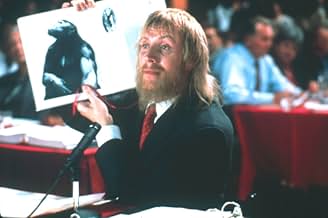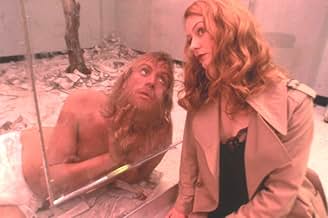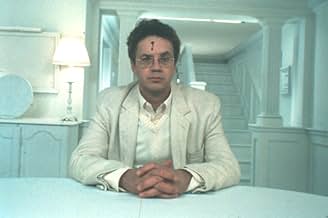Human Nature
- 2001
- Tous publics
- 1h 36min
NOTE IMDb
6,4/10
19 k
MA NOTE
Une femme est éprise d'un homme amoureux d'une autre femme, et tous trois ont des vues sur un jeune homme qui a grandi dans une famille de singes.Une femme est éprise d'un homme amoureux d'une autre femme, et tous trois ont des vues sur un jeune homme qui a grandi dans une famille de singes.Une femme est éprise d'un homme amoureux d'une autre femme, et tous trois ont des vues sur un jeune homme qui a grandi dans une famille de singes.
- Réalisation
- Scénario
- Casting principal
- Récompenses
- 2 victoires et 2 nominations au total
Stanley DeSantis
- Doctor
- (as Stanley Desantis)
Chase MacKenzie Bebak
- Young Nathan
- (as Chase Bebak)
Avis à la une
10Eli-18
'Human Nature' will inevitably be reviewed in comparison to 'Being John Malkovich', and the comments will be along the lines of 'less coherent', 'not likely to be as commercially successful', etc. But should these be reasons to NOT see this movie? Only if you want to miss the most intelligent movie to come out since BJM. Forget 'A Beautiful Mind', which gives the appearance of intelligence by flaunting pseudo-guru math, but was just another sappy tale of 'the triumph of the human spirit'.
What makes 'Human Nature' and BJM a cut above the usual cinema drivel, is that they actually attempt to get into some serious philosophical issues. BJM delves into personal identity, while 'Human Nature' digs even deeper into the realm of our underlying... human nature. What makes human nature any better than animal nature? civilization? language? manners? And do these distinctly human features actually make us better, or just different, or different in a bad way... i.e. by making us lead dual lives, tearing our originally united being into inharmonious halves (subjective/objective)? And can we simply unite our duplicitousness by forgetting language, civilization, and manners... by returning to nature? Or, with a philosopher who gets an intensional nod in 'Human Nature', Wittgenstein, are we stuck in language, forever banished from the garden of eden?
This movie raised all of these questions, and more, for me... which is what I expect out of a good movie: not only does it entertain us, but it invites us to join in the entertaining. By posing these questions, it challenges us to answer them, and to ask our own questions of it... which means that we have to see it again in order for it to continue the dialogue. Now that's what I call interactive movie-going. Philosophy has started some great stuff in history: religion, government, science. So I think that's its not asking too much for movies to engage in philosophical debates and trying to include the audience, rather than thinking of the audience as fodder for the box office.
What makes 'Human Nature' and BJM a cut above the usual cinema drivel, is that they actually attempt to get into some serious philosophical issues. BJM delves into personal identity, while 'Human Nature' digs even deeper into the realm of our underlying... human nature. What makes human nature any better than animal nature? civilization? language? manners? And do these distinctly human features actually make us better, or just different, or different in a bad way... i.e. by making us lead dual lives, tearing our originally united being into inharmonious halves (subjective/objective)? And can we simply unite our duplicitousness by forgetting language, civilization, and manners... by returning to nature? Or, with a philosopher who gets an intensional nod in 'Human Nature', Wittgenstein, are we stuck in language, forever banished from the garden of eden?
This movie raised all of these questions, and more, for me... which is what I expect out of a good movie: not only does it entertain us, but it invites us to join in the entertaining. By posing these questions, it challenges us to answer them, and to ask our own questions of it... which means that we have to see it again in order for it to continue the dialogue. Now that's what I call interactive movie-going. Philosophy has started some great stuff in history: religion, government, science. So I think that's its not asking too much for movies to engage in philosophical debates and trying to include the audience, rather than thinking of the audience as fodder for the box office.
"Human Nature" is just one example of what happens when you combine a script written by Charlie Kaufman, the directorial talents of Michel Gondry, and a stellar cast featuring Tim Robbins, Patricia Arquette, and Rhys Ifans.
The movie may not be up to par with Kaufman's other works such as "Being John Malkovich" and "Eternal Sunshine Of The Spotless Mind," but it does great at utilizing the usual elements that make a great Kaufman script: Eccentricity, great dialogue, and sometimes dark humor.
This film also happens to be director Michel Gondry's first directorial effort. While the film does lack some of the trademarks that Gondry would use in the other films of his career, (specifically his manipulation of the mise en scene) this film is, after all, his first directorial effort. Sometimes directors don't immediately find out what their main style is on their debut films.
Then you have the performances of the cast. Tim Robbins and Patricia Arquette shine in their respectful places as the male and female leads, but I believe Rhys Ifans deserves a bit more love. His performance as Puff is one that I feel is wildly underrated.
Overall, "Human Nature" is worth a go, especially if you like anything with Charlie Kaufman or Tim Robbins or Patricia Arquette written on it.
The movie may not be up to par with Kaufman's other works such as "Being John Malkovich" and "Eternal Sunshine Of The Spotless Mind," but it does great at utilizing the usual elements that make a great Kaufman script: Eccentricity, great dialogue, and sometimes dark humor.
This film also happens to be director Michel Gondry's first directorial effort. While the film does lack some of the trademarks that Gondry would use in the other films of his career, (specifically his manipulation of the mise en scene) this film is, after all, his first directorial effort. Sometimes directors don't immediately find out what their main style is on their debut films.
Then you have the performances of the cast. Tim Robbins and Patricia Arquette shine in their respectful places as the male and female leads, but I believe Rhys Ifans deserves a bit more love. His performance as Puff is one that I feel is wildly underrated.
Overall, "Human Nature" is worth a go, especially if you like anything with Charlie Kaufman or Tim Robbins or Patricia Arquette written on it.
There are many different kinds of movies. This is one of a rare species: a film with a message. Other people might hear different morals when watching it, or none at all, which is okay, too. But to me, Charlie Kaufman wants to tell us "deprive an adolescent of his right to a natural sexual development and you create a violent outburst".
Director Michel Gondry presents you a satire. The comedic element comes from grotesque, which is a relief after the all too juvenile teen movies that pathetically try to generate laughter by gross embarrassment and over-emphasized sounds of rearward body functions.
Instead of telling the story of average parents struggling to deal with their teenage son, you will find a) a woman with excessive body hair (in my view representing all your everyday discontent with your true self), and b) a man with an obsessive compulsion to demand perfect table manners (which of course stands for the misuse of parental power to force his unfounded views onto his "son")
The adolescent in this film being troubled by his sexual awakening is not the usual cool, hip, handsome high-school kid that all the real cool, hip,... okay-looking high-school-kids don't want to identify with anyway. It's Puff (Rhys Ifans), a young man who was raised by a deranged father to believe that he is an ape. This brings him in a situation not totally unlike that of a (human) teenager: somehow like the other humans, but being told that he's all weird and that everything he knows is suddenly wrong and bad. Eager to learn and please, he tries his best to conform, but to "control", that is, to ignore and deny his sexual curiosity, is just asking too much and he is forced to resort to deception.
It always amazes me how we Americans keep wondering why we have about 200x more shooting deaths than (other) civilized countries. One reason can be seen in the ratings for this particular film. Europe: around 12 (France: PG), USA: R, for it's hard to spot nudity. This is ironic confirmation of what the film is trying to draw attention to: by demonizing Puff's sexuality and using violence to suppress it, both Nathan and Lila become guilty of creating violence in turn.
For viewers who find this to be what this movie is about, I strongly recommend Michael Moore's Bowling for Columbine (Title 0310793 here on IMDB.com) only it is not so funny, because it's a documentary.
Director Michel Gondry presents you a satire. The comedic element comes from grotesque, which is a relief after the all too juvenile teen movies that pathetically try to generate laughter by gross embarrassment and over-emphasized sounds of rearward body functions.
Instead of telling the story of average parents struggling to deal with their teenage son, you will find a) a woman with excessive body hair (in my view representing all your everyday discontent with your true self), and b) a man with an obsessive compulsion to demand perfect table manners (which of course stands for the misuse of parental power to force his unfounded views onto his "son")
The adolescent in this film being troubled by his sexual awakening is not the usual cool, hip, handsome high-school kid that all the real cool, hip,... okay-looking high-school-kids don't want to identify with anyway. It's Puff (Rhys Ifans), a young man who was raised by a deranged father to believe that he is an ape. This brings him in a situation not totally unlike that of a (human) teenager: somehow like the other humans, but being told that he's all weird and that everything he knows is suddenly wrong and bad. Eager to learn and please, he tries his best to conform, but to "control", that is, to ignore and deny his sexual curiosity, is just asking too much and he is forced to resort to deception.
It always amazes me how we Americans keep wondering why we have about 200x more shooting deaths than (other) civilized countries. One reason can be seen in the ratings for this particular film. Europe: around 12 (France: PG), USA: R, for it's hard to spot nudity. This is ironic confirmation of what the film is trying to draw attention to: by demonizing Puff's sexuality and using violence to suppress it, both Nathan and Lila become guilty of creating violence in turn.
For viewers who find this to be what this movie is about, I strongly recommend Michael Moore's Bowling for Columbine (Title 0310793 here on IMDB.com) only it is not so funny, because it's a documentary.
Finally, a definitive answer to the question, "What is human nature?" Actually, "Human Nature" is not the answer to that question, but it does address other issues, one of which is the nature of comedy. Many, if not most, people who see "Human Nature" will not care for it. I was going to say "not get it", but that is condescending. I think "Human Nature" is a hilarious comedy. It's extreme adsurdity makes it so. It combines elements of Pygmalion, Frankenstein and Tarzan into a wonderful, modern day farce. The story is about a love rectangle formed by Nathan Bronfman (Robbins), Lila Jute (Arquettte), Puff (Ifans), and Gabrielle (Otto). Nathan and Gabrielle are somewhat normal (as normal as two scientists can be), but Lila and Puff are a bit off center. She has a problem with body hair which covers her whole body, and Puff, was raised in the wild by his father, who thought he was a gorilla. The story is told through flashback by the dead Nathan, the testifying Puff, and the arrested Lila. Wonderfully done. The one question I had throughout was how Puff came to be testifying in front of congress. The answer was so pat and contrived it was funny. My advice is, go see this movie with 4 or 5 friends, and try and predict which one of you will like it. The rest will hate it.
10bcigor
I don't know what's happening with the votes on this movie. It IS really great. May be people just get offended by lots of nudity in this picture? Why to bother? It's VERY thought-provoking, extremely smart, funny and in a same way sad. I prefer it over Eternal Sunshine sometimes. Really great story about how hopeless we all are. A bit farce, a bit comedy, and great philosophical meaning. Why don't we live in forests? Why don't we try to be free? Why do we live in this world of steel and plastic? Just think about what questions do Kaufman movie rise.
Being John Malkovich .. is pretty shallow, not strong work. I still adore it, but it's worst Kaufmans work for me, though it's extremely original.
Adaptation brings out greatest thoughts about movie-making, about human relations, about creativity and Hollywood, about mainstream and real art. And the funny thing Adaptation even mocks about itself. Great script.
Eternal Sunshine is mainly about love, destiny and memories. Nothing else there. Though i have to admit it's a perfect script.
Human Nature is an anti-human, Greenpeace-pro movie... till the very end. It mocks humanity sometimes, but mostly talks about how self-important we are, how ungracious to the nature around us. But the end ... Well, wont write spoilers here.
This movie is a skeptical answer for all those hopeless romantics out there. And i think it's a great symbiotic relationship. Romance and skepticism.
Being John Malkovich .. is pretty shallow, not strong work. I still adore it, but it's worst Kaufmans work for me, though it's extremely original.
Adaptation brings out greatest thoughts about movie-making, about human relations, about creativity and Hollywood, about mainstream and real art. And the funny thing Adaptation even mocks about itself. Great script.
Eternal Sunshine is mainly about love, destiny and memories. Nothing else there. Though i have to admit it's a perfect script.
Human Nature is an anti-human, Greenpeace-pro movie... till the very end. It mocks humanity sometimes, but mostly talks about how self-important we are, how ungracious to the nature around us. But the end ... Well, wont write spoilers here.
This movie is a skeptical answer for all those hopeless romantics out there. And i think it's a great symbiotic relationship. Romance and skepticism.
Le saviez-vous
- AnecdotesMany of the scenes in the forest are allusions to or recreations of scenes in the Björk music video "Human Behavior", also directed by Michel Gondry.
- GaffesPuff was raised by a madman who never taught him basic language skills or anything about human life. So how does he know the story of being stolen from his mother's apartment?
- Citations
Nathan Bronfman: What is love anyway? From my new vantage point, I realize that love is nothing more than a messy conglomeration of need, desperation, fear of death and insecurity about penis size.
- ConnexionsFeatured in Una Especie de Cine-Teatro Novelesco (2006)
- Bandes originalesHair Everywhere
(2001)
Music and Orchestrations by Jean-Michel Bernard
Lyrics by Charlie Kaufman
Performed by Patricia Arquette
Meilleurs choix
Connectez-vous pour évaluer et suivre la liste de favoris afin de recevoir des recommandations personnalisées
- How long is Human Nature?Alimenté par Alexa
Détails
Box-office
- Montant brut aux États-Unis et au Canada
- 705 308 $US
- Week-end de sortie aux États-Unis et au Canada
- 297 340 $US
- 14 avr. 2002
- Montant brut mondial
- 1 574 660 $US
- Durée1 heure 36 minutes
- Couleur
- Mixage
- Rapport de forme
- 1.85 : 1
Contribuer à cette page
Suggérer une modification ou ajouter du contenu manquant

Lacune principale
By what name was Human Nature (2001) officially released in India in English?
Répondre






































